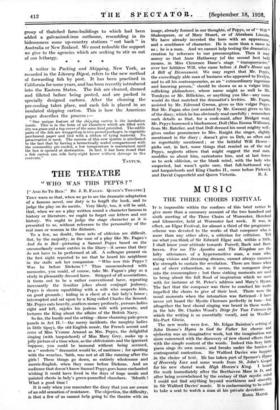THE THEATRE
" WHO WAS THIS PEPYS ?"
t" AND So To Ban." BY J. B. FAGAN. QUEEN'S THEATRE.) THEY warn us that, when we go to see the dramatic adaptation of a famous novel, our duty is to forges the book, and to judge the play on its merits. Very likely,loo, it will be said, that, when we see a play written round a character famous in history or literature, we ought to forget our letters and our history. We ought to judge the stage character as it is presented to us,' without reference to the personality of the real man or woman in the distance.
To a few, no doubt, these acts of oblivion are difficult. But, by the majority, in the case of a play like Mr. Fagan's And So to Bed—picturing a Samuel Pepys based on the unconsciously comic entries in the Diary—it seems that they do not have to be performed at all. A colleague present on the first night reported to me that he heard his neighbour in the stalls ask her companion " Who was this Pepys ?. Was he before Dickens ? " Thus unencumbered with memories, you could, of course, take Mr. Fagan's play as a study in pleasantly dressed farce. ' Stripped of all associations, it turns out to be a rather conventional farce, repeating incessantly the familiar jokes about conjugal jealousy. Pepys is shown squabbling with a wife who suspects him, on good grounds ; hiding in a chest at a fair lady's house ; interrupted and sat upon by a King called Charles the Second. 'Mr. Pepys eats heavily, scatters money profusely, pursues ladies -right and- left, cajoles his jealous wife with presents, and lectures the King about the affairs of the British Navy.
• So far, the bustle and the setting—Ahose charming pale-green panels in Act IL !—the merry incidents, the naughty ladies (a little 'tipsy), the old-English music, the French accent and verve of Miss Yvonne Arnaud as Mrs. Pepys, the delightful Singing (with harpsichord) of Miss Mary Grey, make up a jolly picture of a time when, as the oblivionists and the ignorant suppose, you could be immoral without being accused, as a " modern " dramatist would be, of nastiness ; for sporting with the wenches, 'faith, was not at all like running after the girls ! These things go down, as entirely wholesome and merrie-English, when they come before Dickens. And an audience that doesn't know Samuel Pepys goes home enchanted 'wishing' it could have lived in the days of huge meals and • painted chests in lady's green-pannelled chambers. 'Sdeath ! What a good time I
It is only when you remember the diary that you are aware of an odd sensation of resistance. The objection,the difficulty, is that a few of us cannot help going to the theatre with an _ - image, already formed in our thoughts, of Pepys, or of " Will " Shakespeare, or of Mary Stuart, or of Abraham. Lincoln. We have already invested the hero with an appearance and a semblance of character. He is more than a: name to us ; he is a man., And we cannot help testing the .dramatist's creation by reference to 'our preconception. Then it may annoy us that Anne Hathaway (of the second best bed) -monns, in Miss Clemente Dane's stage. ",transparencies," over her faithless Will, who came before A Doll's House and A Bill of Divorcement. We may regret that Mr. Pepis, the exceedingly able man of business who appeared to Evelyn, and to all his contemporaries, as an " extraordinary ingenious and .knowing person," should be shown us as a vulgar little rollicking philanderer, whose , name might as well be Mr. Tomkyns or Mr. Billickins, or anything you like—any name would do that matched the dramatist's levities. Mr. Fagan, assisted by Mr. Edmund •Gwenn, gives us this vulgar Pepys. But Mr. Fagan also (not assisted by Mr..Gwenn) gives us bits of the diary, which he has obviously read carefully ; remembers such details as that, for a cook-maid, after Bridget went, Mr. Pepys borrowed a blackamoor, Doll.(Miss Emma Williams), from Mr. Batelier, and that Doll dressed his meat mighty well ; gives undue prominence to Mrs. Knight the singer, slightly mentioned in the diary ; doesn't give us Deb, so often and so regrettably mentioned ; or the faithful Will Hewer— picks out, in fact, some things that remind us of the real .Pepys, _neglects others that might suggest the . real man, muddles us about him, caricatures him, and at last forces us to seek oblivion, or the blank mind, with the lady who suspected, but wasn't quite sure, that full-bottomed wigs and harpsichords and King Charles H., came before Pickwick
and David Copperfield and Queen Victoria. R. J.






























































 Previous page
Previous page